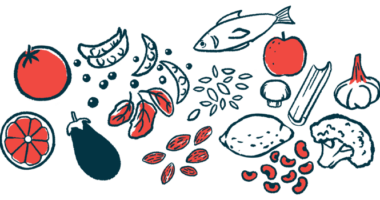Can an anti-inflammatory diet help me manage COPD?
A columnist hopes her dietary changes will promote better overall health

I have embarked on a quest to reduce inflammation in my body, which is largely a result of chronic obstructive pulmonary disease (COPD) and aging. My latest effort is implementing an anti-inflammatory diet.
When I was younger, anti-aging efforts revolved around preventing wrinkles and changes in body shape. But now that I’m old, I’m focused more on maintaining my ability to care for myself — though I still slather on that night cream before bed!
I’ve also learned not to partake in something just because it’s trending, so I’ve done my research and found evidence that my quest is legitimate. Of course, it’s always important to talk with your doctor before making any major dietary or lifestyle changes. But the following is what I’ve learned about how inflammation plays a role in some of my maladies.
The role of inflammation
Inflammation and narrowing of the airways are hallmarks of COPD. As a 2017 article published in the European Respiratory Review notes, “COPD pathology is driven by chronic inflammation, which continues to be observed after stopping smoking.” This can lead to lung tissue damage and, eventually, a remodeling of the lungs.
Increased inflammation is also associated with aging — a concept sometimes referred to as “inflammaging.” A 2014 article in The Journals of Gerontology notes that, “Inflammaging is a highly significant risk factor for both morbidity and mortality in … elderly people, as most if not all age-related diseases share an inflammatory pathogenesis.”
I also have osteoarthritis, which is the most common form of arthritis. The degenerative disease occurs when cartilage in the joints breaks down over time, though according to a review published earlier this year in the journal Clinical Reviews in Allergy & Immunology, experts now believe that inflammaging contributes to the development of osteoarthritis. I have to take meloxicam, an anti-inflammatory medication, to deal with the arthritis in my hips.
I reason that if I can reduce the inflammation in my body, I can improve my quality of life. Since my little garden is producing great components of a nutritious diet, I decided that this was a suitable time to initiate some new eating habits.
Implementing my new diet
Tomatoes are considered an anti-inflammatory food, and thankfully, the tasty red delights that I pick from my garden are delicious and in ample supply. My lovely green beans and summer squash are also on my list of things to eat.
I like to keep things simple, so I think of an anti-inflammatory diet as consisting mostly of “real food” (which I define as food I must prepare, like the wonderful squash casserole I made last week), rather than processed or prepackaged foods. Focusing on filling my diet with whole ingredients is half the work.
In addition, I must also be aware of the inflammation-promoting foods I should avoid, such as red meat, refined carbohydrates like white bread and pasta, and saturated fats. I can eat a modest amount of low-fat dairy products, olive oil, and unsaturated fats.
This shouldn’t be too hard, as I’ve long refrained from white bread and most cooking oils except for olive. Plus, I already have many fish products in my freezer.
I must confess that I do add bacon to my green beans, making them a little less healthy for me — but they certainly taste better that way.
These dietary changes may not reduce my inflammation by an enormous amount, but I’m enjoying the food I’m eating, and even a small decrease in inflammation could help me breathe and feel better. So I think I’ll stick to my eating plan.
Have you tried an anti-inflammatory diet? Please share your experience in the comments.
Note: COPD News Today is strictly a news and information website about the disease. It does not provide medical advice, diagnosis, or treatment. This content is not intended to be a substitute for professional medical advice, diagnosis, or treatment. Always seek the advice of your physician or other qualified health provider with any questions you may have regarding a medical condition. Never disregard professional medical advice or delay in seeking it because of something you have read on this website. The opinions expressed in this column are not those of COPD News Today or its parent company, BioNews, and are intended to spark discussion about issues pertaining to chronic obstructive pulmonary disease.








Comments